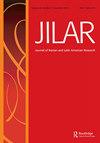Políticas cooperativas de segurança e combate ao crime organizado na Tríplice Fronteira
IF 0.3
0 HUMANITIES, MULTIDISCIPLINARY
Journal of Iberian and Latin American Research
Pub Date : 2021-01-02
DOI:10.1080/13260219.2021.1947350
引用次数: 0
Abstract
ABSTRACT This article is an analysis of the cooperative security initiatives developed by Brazil, Argentina and Paraguay in the period beginning in 1996, with the establishment of the “Agreement on Security and Ease of Transit of the Tri-border Area,” until 2016. For this purpose, a brief historical background on the transnationalization of organized crime in the region of the tri-border area was made, and in the following section, an analysis of the main policies, agreements and security actions of these countries, considering mainly those aimed at reducing organized crime activities in border regions. From this analysis, it was possible to understand which factors influenced the decision-making of these countries, such as the strong U.S. presence and antiterrorist discourse, the mutual mistrust generated by cases of corruption in police institutions and border control, and social weaknesses still present on the tri-border area. It was also discussed who were the main parastatal actors involved in the process of elaborating the cooperative actions.三边合作安全政策和打击有组织犯罪
摘要本文分析了巴西、阿根廷和巴拉圭在1996年至2016年期间制定的合作安全倡议,这些倡议包括“三边地区安全和便利过境协定”。为此,简要介绍了三国边境地区有组织犯罪跨国化的历史背景,并在下一节中分析了这些国家的主要政策、协议和安全行动,主要考虑到旨在减少边境地区的有组织犯罪活动的政策、协议。通过这一分析,可以了解哪些因素影响了这些国家的决策,例如美国的强大存在和反恐话语,警察机构和边境管制腐败案件产生的相互不信任,以及三国边境地区仍然存在的社会弱点。还讨论了参与制定合作行动过程的主要半官方行为者。
本文章由计算机程序翻译,如有差异,请以英文原文为准。
求助全文
约1分钟内获得全文
求助全文
来源期刊

Journal of Iberian and Latin American Research
HUMANITIES, MULTIDISCIPLINARY-
CiteScore
0.60
自引率
0.00%
发文量
22
 求助内容:
求助内容: 应助结果提醒方式:
应助结果提醒方式:


